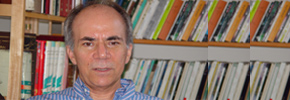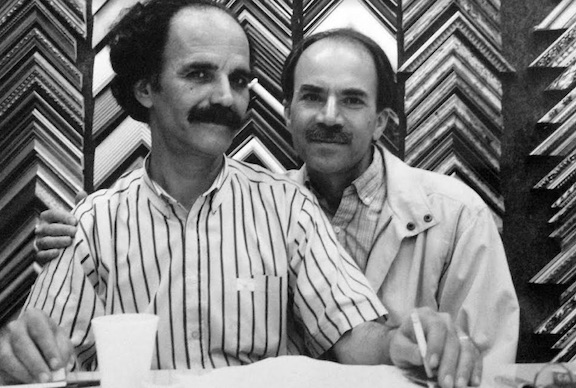بهمناسبت چهلمین سالگرد انقلاب
بازگشت به باغ گوته

مجید نفیسی
اگر پسرت از تو بپرسد
که بهترین روزِ انقلاب کدام بود
به او چه خواهی گفت؟
که بهترین روزِ انقلاب کدام بود
به او چه خواهی گفت؟
آیا بی درنگ می گویی: 22 بهمن 57؟
روزی که همراه با مردم دروازه ی زندان اوین را گشودی
و در آشپزخانه، آبکش های بزرگ برنج را دیدی
که زندانبانان کهنه برای ناهار پالوده بودند
و زندانبانان تازه برای شام خود پختند،
و تو همراه با عزت طبائیان
به نُه توی بندها پا گذاشتی
و در بندِ سلول های انفرادی
برای چند دقیقه ی بی پایان
پشت دری خودکار، به دام افتادی
جایی که عزت سه زمستان دیرتر از آن
به میدان تیر برده شد.
روزی که همراه با مردم دروازه ی زندان اوین را گشودی
و در آشپزخانه، آبکش های بزرگ برنج را دیدی
که زندانبانان کهنه برای ناهار پالوده بودند
و زندانبانان تازه برای شام خود پختند،
و تو همراه با عزت طبائیان
به نُه توی بندها پا گذاشتی
و در بندِ سلول های انفرادی
برای چند دقیقه ی بی پایان
پشت دری خودکار، به دام افتادی
جایی که عزت سه زمستان دیرتر از آن
به میدان تیر برده شد.
شاید بگویی: 26 دی 57
روزی که شاه برای بار دوم از ایران گریخت
و شورشیانِ تندیس شکن در میدان شهر
پدر او را از اسب پایین کشیدند
و تو در تاریکی تکه ای از کلاه او را
برای یادگاری از زمین برداشتی
و به عزت که در کنارت ایستاده بود گفتی
که نمی دانی خواب می بینی یا بیداری
مانند شبی که نخستین بار عشق بازی کردید
و تو ناباورانه چشم هایت را می مالیدی.
روزی که شاه برای بار دوم از ایران گریخت
و شورشیانِ تندیس شکن در میدان شهر
پدر او را از اسب پایین کشیدند
و تو در تاریکی تکه ای از کلاه او را
برای یادگاری از زمین برداشتی
و به عزت که در کنارت ایستاده بود گفتی
که نمی دانی خواب می بینی یا بیداری
مانند شبی که نخستین بار عشق بازی کردید
و تو ناباورانه چشم هایت را می مالیدی.
نه! نه!
دیگر دلت برای هیچیک از آن دو روز تنگ نمی شود
زیرا زندان تازه از زندان کهنه مخوف تر است
و خودکامه ی امروز ستمکارتر از خودکامه ی دیروز.
تنها دلت برای یک شب تنگ شده
وقتی که در 22 مهر 56
در پنجمین شب از ده شب شعر
همراه با هوشنگ گلشیری زیر باران
قدم زنان به باغ گوته رفتی
تا به "آوازهای بند" سعید سلطانپور گوش کنی
که تازه از زندان درآمده بود
و چون پلنگی زخمی می غرید.
دیگر دلت برای هیچیک از آن دو روز تنگ نمی شود
زیرا زندان تازه از زندان کهنه مخوف تر است
و خودکامه ی امروز ستمکارتر از خودکامه ی دیروز.
تنها دلت برای یک شب تنگ شده
وقتی که در 22 مهر 56
در پنجمین شب از ده شب شعر
همراه با هوشنگ گلشیری زیر باران
قدم زنان به باغ گوته رفتی
تا به "آوازهای بند" سعید سلطانپور گوش کنی
که تازه از زندان درآمده بود
و چون پلنگی زخمی می غرید.
در آن ده شب درخشان
شصت گوینده و نویسنده ی "کانون"
از چهار سوی میهن گرد آمدند
تا از زیبایی و حقیقت
با چند آوایی سخن بگویند:
عمران صلاحی شعری به زبان ترکی خواند
و طاهره صفارزاده سلام نامه ای به اسلام.
نه اولی خشم فارسی زبانان را برانگیخت
و نه دومی قهر چپ گرایان را.
هزاران هزار خواهنده ی شعر
از سراسر کشور به آنجا آمدند
تا گواهی دهند که نیاز شعر
آزادی در سخن گفتن است.
شصت گوینده و نویسنده ی "کانون"
از چهار سوی میهن گرد آمدند
تا از زیبایی و حقیقت
با چند آوایی سخن بگویند:
عمران صلاحی شعری به زبان ترکی خواند
و طاهره صفارزاده سلام نامه ای به اسلام.
نه اولی خشم فارسی زبانان را برانگیخت
و نه دومی قهر چپ گرایان را.
هزاران هزار خواهنده ی شعر
از سراسر کشور به آنجا آمدند
تا گواهی دهند که نیاز شعر
آزادی در سخن گفتن است.
آیا در آن شبهای روشن
اسلام کاظمیه می دانست که تا دو دهه ی دیگر
در پاریس، راه هوا را بر خود خواهد بست؟
آیا مصطفی رحیمی پیش بینی می کرد
که سالها پس از تحمل شکنجه و زندان
خود را از بام خانه پایین خواهد انداخت؟
آیا به آذین حدس می زد که پس از بازداشت
در "صدا و سیما" علیه خود شهادت خواهد داد؟
آیا سعید سلطانپور می دانست که در شب عروسی اش
دستگیر شده و سپس تیرباران خواهد شد؟
آیا سیاوش کسرائی خبر داشت که سرانجام
بی کمان در کابل ... نه ... در وین خواهد افسرد؟
در شب های شعر، صحبت از آزادی و برابری بود
و کسی از قانون الهی سنگسار سخن نمی گفت.
هیچکس نمی دانست که در 17 دی
درفش حسینی در قم بالا می رود
و آرام آرام به جای "مسکن" و "آزادی"
"حکومت اسلامی" شعار روز می شود.
اسلام کاظمیه می دانست که تا دو دهه ی دیگر
در پاریس، راه هوا را بر خود خواهد بست؟
آیا مصطفی رحیمی پیش بینی می کرد
که سالها پس از تحمل شکنجه و زندان
خود را از بام خانه پایین خواهد انداخت؟
آیا به آذین حدس می زد که پس از بازداشت
در "صدا و سیما" علیه خود شهادت خواهد داد؟
آیا سعید سلطانپور می دانست که در شب عروسی اش
دستگیر شده و سپس تیرباران خواهد شد؟
آیا سیاوش کسرائی خبر داشت که سرانجام
بی کمان در کابل ... نه ... در وین خواهد افسرد؟
در شب های شعر، صحبت از آزادی و برابری بود
و کسی از قانون الهی سنگسار سخن نمی گفت.
هیچکس نمی دانست که در 17 دی
درفش حسینی در قم بالا می رود
و آرام آرام به جای "مسکن" و "آزادی"
"حکومت اسلامی" شعار روز می شود.
بیا به باغ شعر گوته برگرد
دوباره زیر درختان باران خورده بنشین
و بی اعتنا به گاردی ها
که از پشت دیوارهای باغ
با بی سیم هایشان حرف می زنند
به مریم، دختر محمد قاضی گوش کن
که پیام پدر را برای تو می خواند.
دریغ که تیغه ی جراح، تارهای صوتی پدر را گسسته
ولی خوشا که گوهر سخن را از او نگرفته است.
دوباره زیر درختان باران خورده بنشین
و بی اعتنا به گاردی ها
که از پشت دیوارهای باغ
با بی سیم هایشان حرف می زنند
به مریم، دختر محمد قاضی گوش کن
که پیام پدر را برای تو می خواند.
دریغ که تیغه ی جراح، تارهای صوتی پدر را گسسته
ولی خوشا که گوهر سخن را از او نگرفته است.
بیا به خانه ی دانش و هنر برگرد
و تنها قلب افراد را
بیتِ ایمان بدان
بیا از باغ دلگشای گوته
به بهترین روزهای دوران انقلاب بازگرد.
شاید در این سفر
پسرت همراه تو گردد.
و تنها قلب افراد را
بیتِ ایمان بدان
بیا از باغ دلگشای گوته
به بهترین روزهای دوران انقلاب بازگرد.
شاید در این سفر
پسرت همراه تو گردد.
مجید نفیسی
۱۷ نوامبر ۲۰۱۱
۱۷ نوامبر ۲۰۱۱
http://iroon.com/irtn/blog/13533/for-the-fortieth-anniversary-of-the-revolution/
"And yet it does turn!" Galileo Galilei (1564-1642)
***
For the Fortieth Anniversary of the Revolution
Majid Naficy and Hooshang Golshiri Los Angeles April 1992.
A Return to the Garden of Goethe
If your son asks you
When was the best day of the Revolution
What will you tell him?
Will you say instantly: February 11, 1979?
The day you opened the gate of Evin Prison alongside the people
And saw huge colanders of steaming rice in the kitchen
Which old jailors had rinsed for their lunch
And new jailors cooked for their dinner,
And you with your lover Ezzat Tabaian
Stepped into a labyrinth of solitary cells
And for a few endless minutes
Were trapped behind an electronic door
From where Ezzat three winters later
Was sent to the execution field.
Perhaps you will say: January 16, 1979
When the Shah fled Iran for the second time
And the statue-breaking rebels at a Tehran square
Dismounted his father from his horse
And in the dark, you picked up a piece of his hat
From the ground as a keepsake
And told Ezzat at your side
That you did not know if you were awake or asleep
Just as the night when you made love
For the first time
And you rubbed your eyes in disbelief.
No! No!
You miss neither of these two days
Because the new prison is more horrific than the old one
And the new tyrant more ruthless than the previous one.
You miss only one night
When in October 14, 1977
At the fifth night of Ten Nights of Poetry
With your novelist friend Hooshang golshiri
You walked to the garden of Goethe in the rain
To listen to “Songs of Prison” of Saeed Soltanpour
Who had just been released from prison
Roaring like a wounded panther.
In those bright ten nights
Sixty members of Iranian Writers’ Association
Gathered from four corners of the country in Tehran
To speak of truth and beauty polyphonically.
Omran Salahi read a poem in Turkish
And Tahereh Safarzadeh an ode to Islam.
Neither the first enraged the Persian speakers
Nor the second provoked the leftists.
Thousands and thousands of lovers of poetry
Had gathered there from across the country
To testify that poetry
Demands freedom of expression.
In those ten bright nights
Did the novelist Islam Kazemiyeh know that two decades later
He would suffocate himself in Paris?
Did the scholar Mostafa Rahimi foresee
That years after suffering torture and prison
He would jump off the roof of his house?
Did the novelist Behazin predict that after arrest
He would incriminate himself on state TV?
Did the poet Saeed Soltanpour know
That on the night of his wedding
He would be arrested and executed soon after?
Was the poet Siavash Kasrai aware that at his end
He would perish powerless in Kabul…no, in Vienna?
In Nights of Poetry the discourse was freedom and equality
And nobody spoke of the “divine” law of stoning.
No one knew that on January 7, 1978
The clergy would raise their flag in Qom
And gradually the slogan of Islamic Rule
Would replace the slogan of Housing and Freedom.
Come, return to the Garden of Goethe’s Poetry
Sit again under rain-laden trees,
Oblivious to riot police
Talking to each other on their walkie-talkies
Behind the walls of the Garden,
And listen to Maryam the daughter of the translator Mohammad Qazi
Who is reading her father’s speech for you.
Alas! A surgeon’s knife had severed her father’s vocal cords
But thankfully did not remove the essence of his speech.
Come, return to the house of science and art
And regard only the heart of the individual
As the House of Faith.
Come, and from the refreshing Garden of Goethe
Return to the best days of the Revolution.
Perhaps in this journey
Your son will accompany you.
Majid Naficy
November 17, 2011
"And yet it does turn!" Galileo Galilei (1564-1642)

هیچ نظری موجود نیست:
ارسال یک نظر